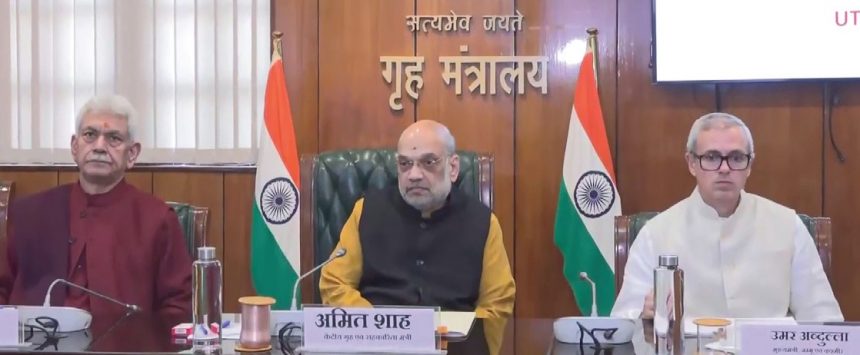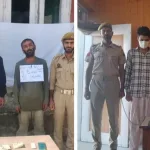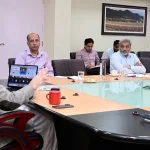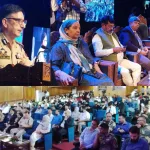JAMMU, FEB 18: Union Home Minister and Minister of Cooperation, Amit Shah, today held a high-level meeting in New Delhi with Lieutenant Governor Manoj Sinha and Chief Minister Omar Abdullah to review the progress of three new criminal laws in the Union Territory (UT).
The meeting, which was attended by senior officials including the Union Home Secretary, J&K’s Chief Secretary, Director General of Police, and heads of the Bureau of Police Research and Development (BPRD) and National Crime Records Bureau (NCRB), centered on the status of the implementation of the three laws—Bharatiya Nyaya Sanhita, Bharatiya Nagarik Suraksha Sanhita, and Bharatiya Sakshya Adhiniyam. These laws, introduced on July 1 last year, replaced the colonial-era Indian Penal Code, Criminal Procedure Code, and Indian Evidence Act. The focus was on their rollout across sectors such as policing, courts, prisons, prosecution, and forensics.
Addressing the gathering, Amit Shah directed the UT administration to ensure the full implementation of the new laws by April 2025. He emphasised the importance of leveraging technology to expedite the delivery of justice under these new provisions, which were introduced under the leadership of Prime Minister Narendra Modi. Shah underscored the need for significant reform within the police force and the administration to adapt to these changes, noting that public awareness is key to their successful implementation.
With a marked decline in terror activities and an improving security situation in Jammu and Kashmir, Shah stated that the protection of citizens’ rights must now be the top priority of the J&K Police. He also highlighted the urgent need for implementing the provision of Trial in Absentia, which would allow proceedings to continue even when accused individuals are not present.
Shah further called for accountability among police officers to accelerate the process of filing chargesheets, stressing that each police station in the UT should maximise its use of the National Automated Fingerprint Identification System (NAFIS). In addition, he directed that all investigating officers receive 100% training in the provisions of the new laws at the earliest.
Emphasising that decisions on matters related to terrorism and organised crime should undergo thorough scrutiny at the level of the Superintendent of Police to prevent misuse of the laws, Shah praised the Jammu and Kashmir administration for its commendable efforts in implementing the new laws despite challenging circumstances, while stressing that progress should be closely monitored.
To ensure smooth and timely execution, Shah proposed that the implementation process should be reviewed on a monthly, fortnightly and weekly basis at the level of the Chief Minister, Chief Secretary and Director General of Police, respectively.
Meanwhile, the Union Home minister has already reviewed the status of the implementation of the new laws in several states, including Uttar Pradesh, Haryana, Uttarakhand, Madhya Pradesh and Gujarat.








